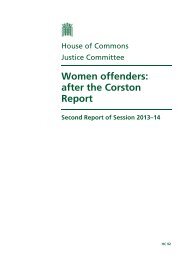Minority voices: Research into the access and acceptability of ... - MMC
Minority voices: Research into the access and acceptability of ... - MMC
Minority voices: Research into the access and acceptability of ... - MMC
- No tags were found...
You also want an ePaper? Increase the reach of your titles
YUMPU automatically turns print PDFs into web optimized ePapers that Google loves.
encountered by <strong>the</strong> researchers provide a vivid illustration <strong>of</strong> <strong>the</strong> challenge facing serviceproviders in this field.For many <strong>of</strong> <strong>the</strong> young people who were interviewed it would seem that <strong>of</strong>ten <strong>the</strong>ir route <strong>into</strong>CAMHS or o<strong>the</strong>r mental health support had been by luck, coming about through <strong>the</strong>m makingcontact with a proactive pr<strong>of</strong>essional with knowledge <strong>of</strong> available services. The data collectedalso indicate that many only reached help at a critical point in <strong>the</strong>ir difficulties, sometimesafter an emergency referral. In addition <strong>the</strong> study findings highlight <strong>the</strong> need to work withparents, <strong>and</strong> also through communities since parental <strong>and</strong> community perceptions <strong>of</strong> a child’sdifficulties <strong>and</strong> <strong>of</strong> mental health service approachability <strong>and</strong> usefulness are clearly an importantinfluence on many young people.It should be noted that many <strong>of</strong> <strong>the</strong>se concerns could be seen to apply to all young peoplerequiring help. However <strong>the</strong>re was an impression <strong>of</strong> <strong>the</strong>se concerns <strong>and</strong> difficulties beingintensified when young people from minority ethnic groups come <strong>into</strong> contact with staff wh<strong>of</strong>eel that <strong>the</strong>y do not have sufficient skills or underst<strong>and</strong>ing <strong>of</strong> differences in culture or ethnicbackground, or who are perceived by young people as lacking <strong>the</strong>se skills.! What sort <strong>of</strong> service provision is needed?The range <strong>of</strong> data collected through <strong>the</strong> study provides some important indications:• Many staff highlighted a lack <strong>of</strong> joined-up activity <strong>and</strong> limited knowledge <strong>of</strong> existingservices as a key problem in improving information sharing <strong>and</strong> thus <strong>access</strong> to services.• In particular, <strong>the</strong> lack <strong>of</strong> partnership working between CAMHS <strong>and</strong> voluntary sectorprovision in many areas <strong>of</strong> <strong>the</strong> country was highlighted, also that a considerableamount <strong>of</strong> innovative work in <strong>the</strong> voluntary sector is being lost due to fundinginstability.• Staff interviews also revealed concerns about a lack <strong>of</strong> training in race equality <strong>and</strong>cultural competence (for both administrative <strong>and</strong> clinical staff in CAMHS).• Young people made many suggestions for how services could be improved. Theseincluded: more flexible hours when services are available, more opportunities to drop-inor self-refer; a greater choice <strong>of</strong> venues <strong>and</strong> <strong>the</strong> need for more interpreters/resourcesfor those who do not read/speak English. Greater pr<strong>of</strong>essional awareness <strong>of</strong> <strong>the</strong> culturalcontext <strong>of</strong> issues that impact on young people from Black <strong>and</strong> minority ethnic groups,<strong>and</strong> those with refugee or asylum-seeking status, was also mentioned.• Better information sharing through a wider range <strong>of</strong> outlets (especially non-traditionalroutes such as <strong>the</strong> radio, media or church/faith groups) was emphasised <strong>and</strong> shouldinclude self-help information, advice on strategies to deal with difficulties <strong>and</strong>information about how CAMHS operate.• The importance <strong>of</strong> staff being informed <strong>and</strong> aware <strong>of</strong> local mental health services <strong>and</strong>able to support young people in seeking help was a prominent <strong>the</strong>me. A number <strong>of</strong>young people suggested that some sort <strong>of</strong> ‘befriending’ role would be highly useful foryoung people who are fearful <strong>of</strong> approaching CAMHS or o<strong>the</strong>r mental health services,also peer support in raising awareness.• Knowledge <strong>of</strong> religious <strong>and</strong> cultural needs, <strong>and</strong> showing an interest in <strong>the</strong>se, wereidentified as important staff attributes by many <strong>of</strong> <strong>the</strong> young people interviewed.• Both young people from Black <strong>and</strong> minority ethnic groups <strong>and</strong> staff identified <strong>the</strong> needfor provision for young people to address issues <strong>of</strong> grief, past loss, trauma <strong>and</strong>bereavement. Support <strong>and</strong> information for parents from minority ethnic groups in orderto help <strong>the</strong>m underst<strong>and</strong> CAMHS <strong>and</strong> to try <strong>and</strong> reduce <strong>the</strong> stigma/fears connected with<strong>the</strong>ir child receiving help from <strong>the</strong>se services, was also highlighted.<strong>Minority</strong> Voices <strong>Research</strong> Report5
















